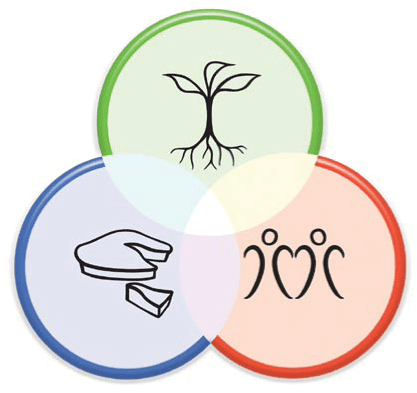Three ethical concepts lie at the heart of Permaculture. They are known as earthcare, peoplecare and fair shares. Expressed this way, they may seem obvious and simplistic, but if we evaluate our choices against these three Ethics, we stand a chance of living in a way that allows all of us – human and otherwise – to flourish.
As a spiritual tradition, Druidry is a free flowing path that encourages people to find their own way on many levels. This includes theology – ideas about deity and the spiritual side of reality – as well as ethics – ideas about good behaviour. So when we are making everyday choices for behaviour that aligns with our Druidry, we need to examine the things we most value.
Druidry values Nature. Some of us revere her as Mother, but at the very least we honour Nature as a teacher and a source of inspiration. We respond to the beauty of Nature wherever it meets us: in the landscape, in trees and animals, and in each other. We craft relationships with the world and its indwelling spirits so that all beings may live abundantly.
How these values translate into decisions and choices is up to each individual. But it is good to have a framework to guide us as we navigate our complicated world and try to make a positive impact. I think the Permaculture Ethics are very useful in that way, and could easily be adopted as a Druid’s Ethics.
The first one, Earthcare, is perhaps the most obviously Druidic. Our reverence of Nature draws us to protect it. This is especially the case when the landscapes we hold dear are immediately under threat. Many Druids are active in the anti-fracking movement, unwilling to see their sacred river polluted, or their oak tree friend cut down.
But Earthcare is more than that. The longer expression of this Ethic is “rebuild natural capital”. It asks us to add to the Earth’s riches to counterbalance what humanity has taken. For a Druid, this may take the form of tree planting, or of enriching the soil of their garden with home-made compost with gratitude for all we have received.
The second Ethic, Peoplecare, speaks to a Druid’s instinctive draw to community. We like to celebrate the turn of the seasons together, and form strong communities around the eight festivals that make our ceremonial year. These rituals in themselves are a form of Peoplecare, bringing us home to the cycles of the seasons in a way that brings meaning to our lives.
Peoplecare asks us to “look after self, kin and community”. When it comes to changing our industrial growth culture to something that values the flourishing of all beings on the planet, the road can be long and hard. We are swimming against a strong current of ideas and habits that are very hard to change. In order to stay resilient, we need to look after each other. We need to create relationships that help us sustain the effort, and we have to make sure that we respect others’ needs and longing to grow.
It is painfully clear by now that our planet cannot sustain us if we keep using and abusing her resources at the rate we currently do. Our actions of greed have consequences for all forms of life, including us. The third Permaculture Ethic, Fair Shares, speaks to this. It tells us that “The world has enough for everyone’s need, but not enough for everyone’s greed,” as Gandhi put it.
It’s obvious, then, that we need to set limits on how much we use. Many Druids already do so, aware of the plight of the planet and willing to take responsibility for their own actions. But there is another side to the Fair Shares Ethic. The longer version reads: “set limits and redistribute surplus.”
That second part can be a wonderful expression of a Druid’s values. As we honour the cycle of the seasons, we consciously pause, eight times a year, to align ourselves with the gifts of Nature in each season. This Ethic inspires me to be more diligent about giving away the surplus fruit from our mature apple and damson trees. Done with conscious intent, sharing of the abundance the Earth can become a sacred act of celebration.
Guided by these three concepts, each of us is free to make our own choices. Balancing our own need for healthy food and the danger of climate change, we have to choose between an organic apple flown in from New Zealand and an ordinary apple grown close to home. Which of those we choose will depend upon our own priorities and circumstances.
But when each of us begin to consider the consequences of our actions in the light of these Ethics, we will surely change the way the world is going. Adjusting our choices to align with all three, we can move towards a culture that supports the flourishing of all beings.
And that is an ideal worth pursuing for any Druid.
Image from permacultureprinciples.com
